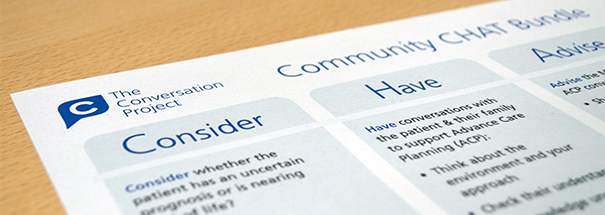Palliative Care |
C3
|
CHAT Bundle
CHAT Bundle

Consider whether the patient has uncertain prognosis or is nearing end of life, and would benefit from ACP discussions
Opportunities for ACP conversations could include:
- Change in condition
- Change in treatment
- Admission/discharge from hospitals
- Admission to a care home
- Patient or family seeks discussions
- As part or management plan or treatment plan reviews
Tools that can support identification of patients with uncertain recovery/poor prognosis are:
Have compassionate conversations to support ACP
Consider the following when having conversations to discuss uncertain recovery/poor prognosis in relation to ACP:
- Check the patient's understanding and consent for the conversation
- Reflect on recent trends
- Reflect on treatment effectiveness
- Acknowledge uncertainty
- Ask 'what matters to you?'
- Listen compassionately to concerns, wishes and preferences
- Reflect on future goals in relation to future deterioration or crisis
- Agree ongoing management plan
Advise the MDT/team and document the outcome of the ACP conversation
- Discuss outcome and recommendations from ACP discussions at MDT and GSF meetings
- Guidance on the completion of Treatment Escalation Plan (TEP) and Recommended Summary Plan for Emergency Care and Treatment (ReSPECT)
- Guidance on information on S1 and making this accessible to out of hours
Transfer information to support continuity of care
- Any Information that supports advance care planning must follow the patient on any transfer of care
- Consider completing Treatment Escalation Plan (TEP) or Recommended Summary Plan for Emergency Care and Treatment (ReSPECT)
- Communicate with key healthcare professionals on any transfer of care
